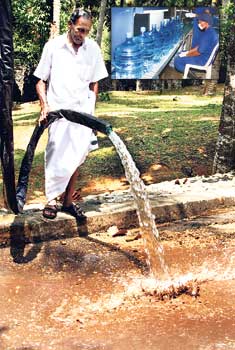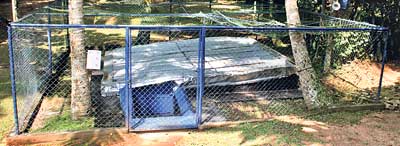Growing industry - Bottling a life source
By Tharindri Rupesinghe
 |
| The bottling plant (inset) and the source. |
Drinking ‘bottled water’ is a concept that was introduced to the Sri Lankan psyche in the late 1980’s. The industry which started out with a few minor companies bottling and selling water without any regulatory framework, is now a thriving business.
Anura Kumarasinghe, retired government servant and Chairman of American Premium Water Systems (Pvt.) Ltd. has been in the bottled water industry for a very long time. Referring to the industry as “fairly young”, he says that at first, acclimatizing Lankans to ‘buy’ drinking water was very difficult. “When American Premium started, we went from door to door to introduce the product and even left free samples at homes,” he says, adding that after about two weeks usage people liked the idea very much.
Phases of water
The whole industry went through three typical phases, he says. At the initial stage, in the late 1980’s, the industry was at its most primitive. Bottled water was consumed mainly by the tourists and that too was hampered by the political uprisings that occurred during that period.
With the economy getting back on its shaky feet, the industry went through what he calls the “Copying phase”, where bottled water manufacturers mushroomed in the city. This, he says was brought on by a project proposal by the Investment Development Board (IDB) naming Bottled Water to be an ideal industry for SME’ s to invest in.
The Health Ministry then stepped in, making registration under their ministry mandatory to market bottled water. The industry has now settled itself firmly in the economy.
The current situation is that any company that wishes to market bottled water must be registered under the Health Ministry to do so. “When the regulations came in, many of the small-timers dropped out because they couldn’t keep to the requirement,” says Kumarasinghe.
The “Bottled Water Registration” was introduced in 2005 and was brought into operation in January 2006. The registration for “Bottled Drinking Water” is valid for three years, during which period the plants are monitored by the authorities. The Registration for “Bottled Natural Mineral Water” (for which UV treatment is not used) is valid for one year only.
 |
| Water spring.
Pix by J Weerasekera |
Assistant Director of the Public Health Division of the Ministry P. Madarasinghe said that there are 94 local brands registered under them, along with six imported brands.
Along with the Ministry registration, many companies usually obtain the SLS 894 awarded by the Sri Lanka Standards Institute (SLSI). The SLS certification is not mandatory but Ms Nayana Satharasinghe, Director Product Certification of the SLSI, says that many companies obtain it for the added image of good hygiene it gives their brand. Some 75 Health Ministry registered local companies have been awarded the SLS certification for “Bottled drinking water”. According to her water can be marketed under two categories. The first is the more common “Bottled Drinking Water”, which has the SLS 894 certification and must comply with the Sri Lanka standard code of practice stated under SLS 1211. The other is as “Bottled natural mineral water” which gets the SLS certification 1038, and must follow the code of practice set under SLS 1021. The processes followed for the purification of water are different in the two cases.
The SLSI, she says, has a number of quality parameters that they examine before giving out the certification. The standard of the water source, the process control and the consistency of the records kept are among them.
 |
| Anura
Kumarasinghe |
Off the stove into the bottle
According to Kumarasinghe, the trend of drinking bottled water has been triggered by many factors, mainly the hectic lifestyles led by the working class. Boiling water is a time and energy consuming task and carrying water around is the same. Added to this, the rising prices of gas has had many households resorting to heating water on constructed wood stoves or ‘dara lipas’, a time-consuming task. There are six Ministry-registered importers of bottled water in the local industry. According to Ministry officials, there have been protests against importing water when the country has its own reserves. The reason is that most tourists demand the particular brand of water that they usually patronize, these mainly being the larger European and US names.
Ironically, many areas in the country, especially those in the dry zone, are hopelessly short of water. Anuradhapura and Polonnaruwa are annually plagued with various liver diseases brought on by unsafe drinking water. In light of all this, many have commented that exporting bottled water- a venture that many firms are looking into- is unfair.
Shane Van Eyck, General Manager of ‘Silver Springs’ Waters, takes a different view. The company is looking into breaking into the international market with their brand. “The international market is full of the ‘Evian’s and the likes, and we want to put a Sri Lankan brand up there as well,” he says. He agrees that there are areas that are impoverished but adds that the country would be helped by the export revenues, ““We are giving something back to the country as well, by getting in the foreign exchange” he says.
| This is what you drink |
When you buy a bottle of water, do you actually wonder about the origin of the contents of the water and how safe it is to drink it? American Premium Water Systems (Pvt.) Ltd. is one of the best known names in the water business. The company which is a joint venture with the US-based company American Liquid Packaging Systems Inc. (ALPS) has its main plant in Ranala, Hanwella. Visiting the plant recently, The Sunday Times FT was given an insider look into the workings of the bottled water process.
Source
Hanwella is famed for its pure ground-water bed. The source of the water is one of the most essential factors that come into play in the bottled water industry, says the General Manager of American Premium Imran Hussain. “If you have a pure water source then the rest of the operation become easier because you don’t have to add anything else to meet the required chemical parameters,” he says. The source in this case is situated away from the factory, in a sprawling 18-acre expanse in Dompe, a 30-minute drive away from the main plant. This ‘source’ is a natural spring that fills water into a 10-foot well, maintaining a constant level of close to 25,000 litres. “Even when you draw the water out in to our tankers, the well never dries up,” says S.M. Bandula, Assistant Manager of Operations. Although there are six identical wells spread out over the area, only one is maintained. As the General Manager explains, the source has to be maintained within stringent hygiene requirements, which are costly. Therefore, water harvesting is done only from one well.
Process
The raw water is pumped into the tankers which in turn are transported to the plant in Hanwella. The tankers take close to 80,000 litres daily to the Hanwella plant. Before the filtering process is done however, samples are taken from the water load to the in-house laboratories for testing. The water is tested for its Ph value, its hardness and conductivity. The filtering is then carried out. The most basic of filters is the well-known Sand Filter, where sand is used to ferret out the larger particles in the water. The Carbon Filter is then used for ridding the water of dank odours. The very small particles which may still be present in the water is then taken care of by the Ultra Filtration process. This is followed by the semi-processed water being stored in the 17,000 L capacity Stainless Steel tank. The last part of the filtering process is the UV-filtering process, where 4 UV bulbs are shone at the water to exterminate any harmful micro organisms.
An important part of having clean drinking water is maintaining the cleanliness of the bottle itself. At American, the plastic bottles are manufactured in-house by Capsnap Lanka Pvt. Ltd., an independent plastics manufacturer located on the premises.
The five gallon bottles are allowed 20 cycles of use before they are discarded. The used bottles are first manually cleaned vigorously using approved chemical detergents and then inserted in to an automated cleaner, the only one of its kind in the local industry.
American Premium specializes in the five gallon water bottles, which they market to hotels, banks (including the Central Bank), some embassies, airlines and factories. The corporate sector takes up 60% of their market while households demand the rest.
M. H. M. Fazal, CEO and Managing Director of American Premium, says that in the five gallon market the company enjoys a five percent market share, although a lower percentage is held with the smaller bottles. The company’s annual growth is stable at 30%-32%. “It is sometimes difficult because we are not an essential good,” he says, adding that for the same reason increasing their prices is very tricky. The demand for bottled water is also mainly from the upper class and the upper-middle class, although the working class demand shows a gradual increase.
While the company has ‘water centres’ in various parts of the island, where customers can buy water “off the shelf”, they also have a number of agents in less inaccessible areas like Kalmunai, Wavuniya and Batticaloa, where he says that the household demand far exceeds the corporate. With the company’s growth, they hope to open plants in Kandy as well as the south, he says.
The CEO also spoke of the plant the company had opened in Chennai, India close to three years ago. Although, South India boasts almost 300 bottled water companies, American Waters has been able to find its way into the top 10 amongst them. On being questioned as to why they picked India, Fazal points to the massive growth in the Indian economy. “The operation has been a success,” he says, adding that the Indian plant has sustained 70%-80% growth over the years.
The company has obtained the SLS certification in addition to the compulsory registration under the Ministry. They also hold the international certifications of ISO and HACCP. Added to this they have also obtained certification from the Asia and Middle East Bottled Water Association (ABWA). (TR)
|
|



